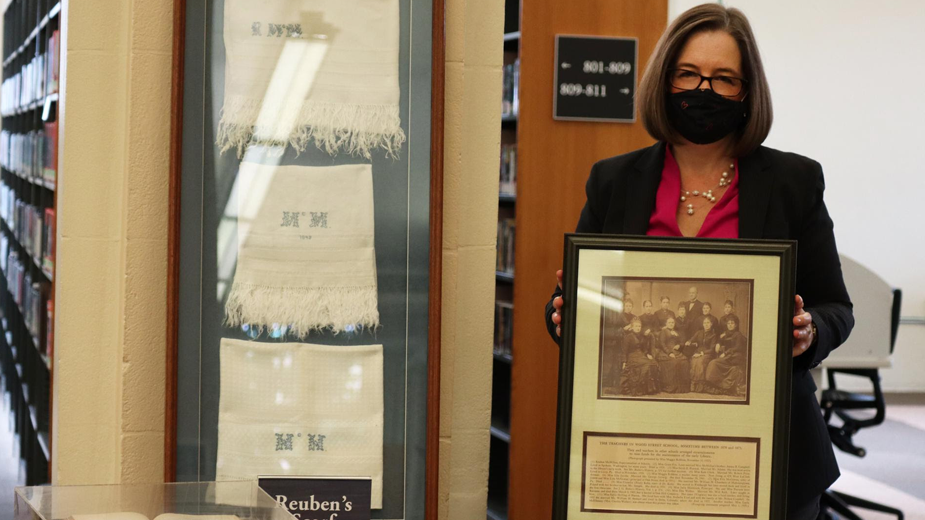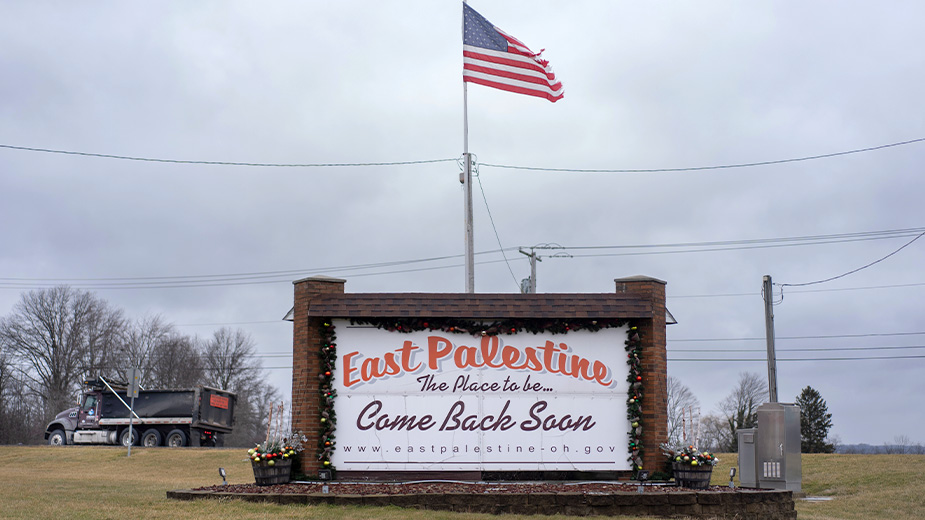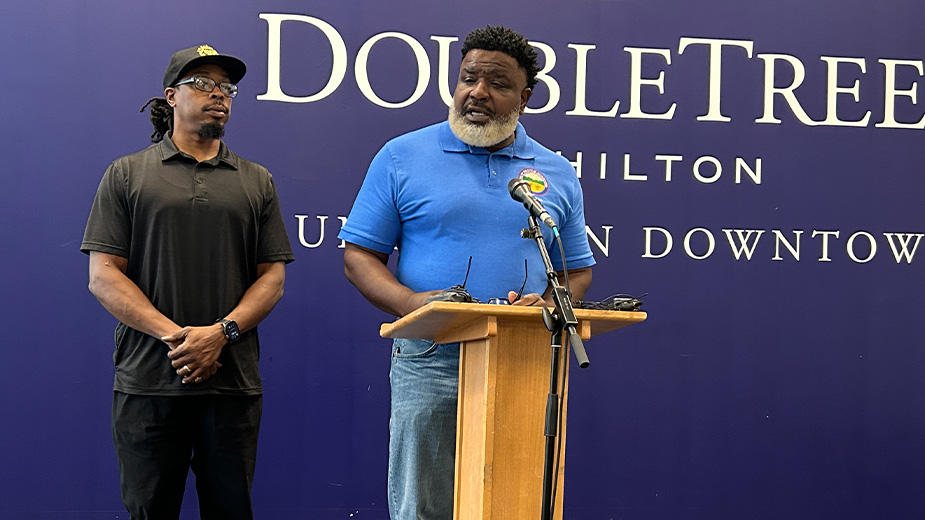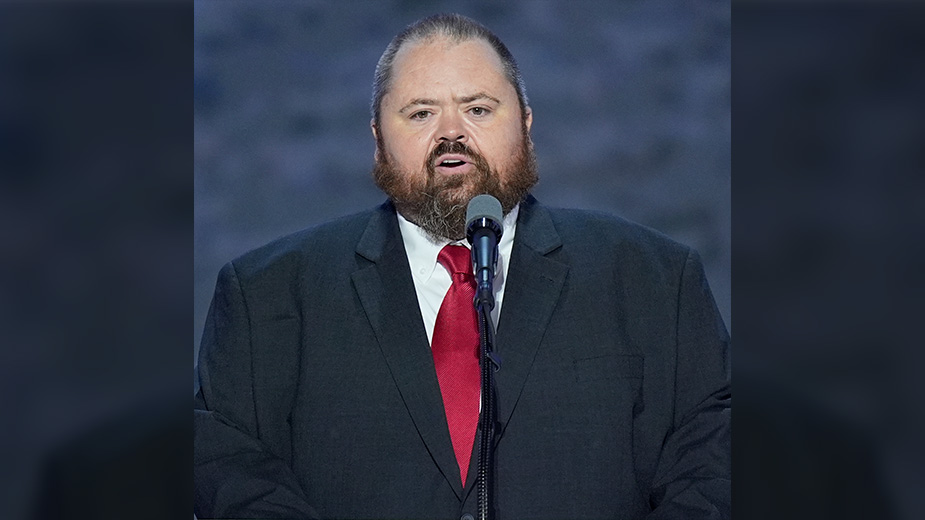Library Announces $1M Capital Campaign on Founder’s 200th Birthday
YOUNGSTOWN, Ohio – On the 200th birthday of one of its founding fathers, the Public Library of Youngstown & Mahoning County announced the launch of a capital campaign to renovate the building that bears his name.
During a live-streamed celebration of Rueben McMillan, who helped found the library in 1880, library trustee Timothy Bresnahan announced the launch of a $1 million fundraising effort to help pay for the renovation of Main Library. Built in 1910 as the Reuben McMillan Free Library, the branch on Wick Avenue is in the midst of a $25 million upgrade that will add 6,000 square feet to the building. The addition will serve as an event space and culinary literacy center.
“He wanted to put books into the hands of all people in our community. He pursued this vision until he and a group of co-founders established the Youngstown Library Association, which later was named for Reuben McMillan,” said Dr. David Ritche, president of the library’s board of trustees. “Reuben McMillan would certainly not recognize some of the changes that have occurred in library materials and technologies. He never saw an e-book, a computer, an iPad or a music CD. But we are sure he would endorse the way our libraries have adapted over the years to be relevant in the year 2020.”
The intent from the beginning of the renovation, which began in August, was to maintain access to Main Library, a promise that Aimee Fifarek, PLYMC executive director, said, she intended to keep.
“We have a population of people we serve who can’t easily get to other locations,” Fifarek said. “While there are locations that are nearby and are easily accessible if you have a vehicle, if you don’t that makes it a little more difficult.”
“Philanthropists have donated in the past and present, making our library system rich in services and programs, and now we are going to give people that same opportunity with this new project,” said Deborah Liptak, the library’s development director. “When community members become a part of our campaigns, they become long-standing supporters of all that the Library can provide.”
In addition to generating community buy-in for the project, which broke ground in August, the fundraising campaign will provide money to go back into the library’s capital fund, the campaign will provide money for features beyond what is now budgeted, Fifarek said.
One specific example, which was contemplated as part of the parking lot work being done, is a rain garden that had been considered for installation in one of the medians, she said. The feature, which would have not only helped with water management in the lot but also provided a STEM education opportunity, would have added $50,000 to the first bid. If the library gets funds for that feature, the feature could be added later.
Liptak and Timothy Bresnahan, chairman of the library trustees’ development committee will have conversations with the individual donors “to see what passions they might have and then to recognize those donations appropriately,” Fifarek said, noting that she will aid when needed.
In addition to seeking support for spaces such as the culinary literacy center that could offer naming opportunities, the library is interested in talking to potential donors about ongoing support for programs, including its business and workforce initiatives, she said.
During the celebration, the library’s executive director, Aimee Fifarek, announced the Main Library would reopen to visitors Oct. 12, with the availability of a temporary space on the first floor. The space will be open Monday through Thursday 11 a.m. to 7 p.m. and Friday and Saturday 9 a.m. to 5:30 p.m.
Patrons will have access to a reduced collection of fiction and nonfiction materials, DVDs, compact discs and 13 public computer workstations, as well as Wi-Fi service and the regular complement of staff, she said.
COVID-19 protections in place at the other branches, including the availability of hand sanitizer, mask requirements, social distancing and reduced capacity will be implemented. The library also is looking at adding purification technology to its air control systems in all of its branches to not only combat the coronavirus but also help kill other viruses and germs.
The maker space at the Michael Kusalaba Branch on Mahoning Avenue will also reopen Oct. 12. All but two features will be available, Fifarek said. The recording booth won’t be available because of its size and the 3D printer, which the library was leasing, was returned.
“We are in the process of trying to locate a new 3D printer that is easier to maintain in a COVID environment,” she said.
While McMillan could never have imagine the library growing into what it is today – with millions of items available for patrons across a swath of technologies that hadn’t been dreamed up in his time – it was his early work that set the foundation for that evolution.
“Thanks to the strong foundation he and our library’s co-founders created, the Public Library of Youngstown and Mahoning County is thriving 140 years later. I am sure Mr. McMillian could not have predicted the intellectual advances or the changes in libraries that the intervening decades have seen,” she added in the video. “But I think he would be proud to know that the organization he worked to create played a role in delivering those advances to his community.”
A short video on the life of McMillan is available on the library’s website, LibraryVisit.org, and on its YouTube page.
Born Oct. 7 near Canfield, McMillan began teaching when he was 20 and, in addition to being a teacher in Mahoning and Columbiana counties, served as a member of the National Education Association, president of the Ohio State Teachers Association and superintendent of the Public Schools of Youngstown.
Though the Youngstown schools had their own libraries since the 1840s, McMillan worked to found a library for all to use. On Oct. 27, 1880, he was joined by two teachers and two physicians to form the Youngstown Library Association, which began operating out of a building on West Federal Street with 168 volumes.
In 1891, the library moved to the home of Richard A. Brown – now the site of the Mahoning County Courthouse – and in 1907 began work on the current library thanks to a $50,000 gift from Andrew Carnegie.
Usually, libraries that received funding from Carnegie were named after the industrialist, but McMillan’s impact was so great that even after he died in 1898, he stood as a model for those working at the library.
“Blessed with great ability, he was also one of the kindliest of men, tender, considerate, devoted to his work and caring little for personal gain,” wrote John H. Clarke, president of the library board and eventual associate justice of the United State Supreme Court. “The poorer children of the schools were the object of his special solicitude. He was a tutor by example as well as precept, living the God fearing life that he encouraged in the youth of Youngstown.”
Pictured: Public Library of Youngstown & Mahoning County’s executive director, Aimee Fifarek, with a historic picture of the library’s board, including Rueben McMillan.
Published by The Business Journal, Youngstown, Ohio.



